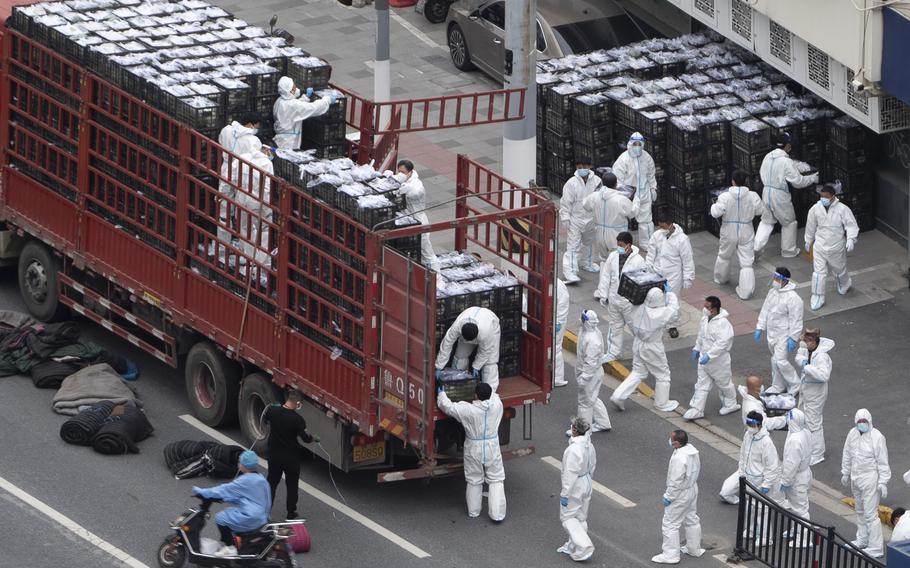
Workers in PPE unload groceries from a truck before distributing them to local residents under the COVID-19 lockdown in Shanghai, China on Tuesday, April 5, 2022. The COVID-19 outbreak in China’s largest metropolis of Shanghai remains “extremely grim” amid an ongoing lockdown confining around 25 million people to their homes, a city official said Tuesday. (Chinatopix Via AP)
Stars and Stripes is making stories on the coronavirus pandemic available free of charge. See more stories here. Sign up for our daily coronavirus newsletter here. Please support our journalism with a subscription.
Even the wealthy are struggling to buy food as Shanghai's lockdown drags on.
Kathy Xu, one of China's top venture capitalists and an investor in grocery businesses including Meituan, Yonghui Superstores Co. and DingDong Maicai, turned to a community WeChat group to get bread and milk, according to a post seen and verified by Bloomberg News. Capital Today, the company she founded and which manages $2.5 billion, didn't immediately respond to a request for comment.
Xu's post reflects that food shortages are hitting the city's high-earners after middle-class residents have been struggling for weeks.
Shanghai is the epicenter of China's worst outbreak since the early days of the pandemic in Wuhan and authorities have doubled down on their Covid Zero pillars of mass testing and lockdowns to try and stamp out infections. It's swiftly turned into a logistical nightmare as the city's 25 million residents - sealed off in their homes for more than a week already - struggle to get basic groceries delivered and officials seek to censor growing public discontent.
Officials have stepped up assistance in recent days, with some residents receiving packs including eggs, milk, vegetables and meat. But some areas of the city haven't received them and delivery apps can't keep up with the surging number of people trying to get a hold of daily necessities as drivers are also locked down.
It's sparked a rise in group-buying, in which a residential compound coordinates bulk purchases and distribution, typically through a WeChat group.
David Fishman, a 32-year-old energy industry consultant, just bought 4,200 yuan ($660) of bread for himself and more than 60 neighbors, which they hope will be delivered on Saturday. He's in three other grocery groups, and still waiting for separate bulk orders of vegetables and pork to be delivered, as well as milk promised by the local resident's committee.
Reaching deals with wholesalers isn't usually a problem, as long as orders meet their minimum price, according to Vivian Feng, who has led group-buying efforts for her residential compound since going into lockdown in mid-March. Still, some residents can balk at the expense or reject orders for other reasons, which can be a pain to manage, she said.
While the buying groups have been effective at getting food to residents, even they're getting overwhelmed by demand.
"I only got to join the group buying in our residential compound once," said Miranda Zheng, who lives in the eastern part of Shanghai and has been quarantined for almost 10 days. "I found a delivery guy on Meituan and tip him hundreds of yuan everyday so that he can send me food."
Authorities on Friday said rumors that Shanghai would halt group purchases were false, and have previously pledged to step up supply efforts.
At a Shanghai municipal briefing Thursday morning, Mao Fang, vice president of Chinese e-commerce giant Meituan, said the food delivery company would bring in 1,000 sorting workers from outside the city to speed up deliveries. Shanghai's Vice Mayor Chen Tong has also said the city is working with online platforms and supermarkets to set up special emergency channels to meet the needs of residents especially the elderly and infants.
With group-buying one of the few ways that families can access enough food during the lockdown, its reliance on lightning-quick text messaging puts some at a disadvantage.
"It's definitely really difficult for the elderly to use as it's totally reliant on a bunch of communication through WeChat groups where information of 200 people is flying by at 20 messages a second," Fishman said. For these people, "how are you supposed to get vegetables? How are you supposed to get food during this period?" he said.